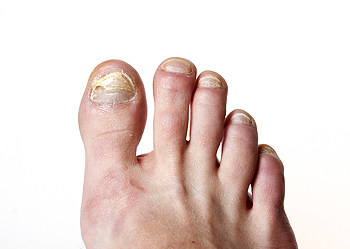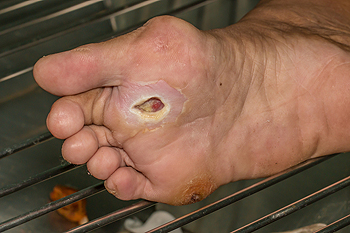Items filtered by date: May 2020
What Are My Next Steps When Diagnosed With Neuropathy?
 Peripheral neuropathy is a condition that impacts the nervous system, often causing complications with the feet. If the nerves in your feet become damaged, they are no longer able to regulate your body temperature, or signal pain as they normally would. Those afflicted with this condition relay experiencing tingling sensations, or numbness in their feet. Neuropathy can be common among diabetic patients, as they are more prone to having complications with their feet. This can be dangerous if wounds go undetected due to the lack of feeling in the feet, as it’s likely an infection may then form. If diagnosed with this condition, medication may be prescribed to help ease the common symptoms. Having a healthy diet, keeping your muscles active and strong, and regularly getting massages or acupuncture may also be helpful in relieving some of the symptoms. For a proper diagnosis and an advised treatment plan, it is suggested that you speak with a podiatrist for professional care.
Peripheral neuropathy is a condition that impacts the nervous system, often causing complications with the feet. If the nerves in your feet become damaged, they are no longer able to regulate your body temperature, or signal pain as they normally would. Those afflicted with this condition relay experiencing tingling sensations, or numbness in their feet. Neuropathy can be common among diabetic patients, as they are more prone to having complications with their feet. This can be dangerous if wounds go undetected due to the lack of feeling in the feet, as it’s likely an infection may then form. If diagnosed with this condition, medication may be prescribed to help ease the common symptoms. Having a healthy diet, keeping your muscles active and strong, and regularly getting massages or acupuncture may also be helpful in relieving some of the symptoms. For a proper diagnosis and an advised treatment plan, it is suggested that you speak with a podiatrist for professional care.
Neuropathy
Neuropathy can be a potentially serious condition, especially if it is left undiagnosed. If you have any concerns that you may be experiencing nerve loss in your feet, consult with one of our podiatrists from Geller Foot Clinic. Our doctors will assess your condition and provide you with quality foot and ankle treatment for neuropathy.
What Is Neuropathy?
Neuropathy is a condition that leads to damage to the nerves in the body. Peripheral neuropathy, or neuropathy that affects your peripheral nervous system, usually occurs in the feet. Neuropathy can be triggered by a number of different causes. Such causes include diabetes, infections, cancers, disorders, and toxic substances.
Symptoms of Neuropathy Include:
- Numbness
- Sensation loss
- Prickling and tingling sensations
- Throbbing, freezing, burning pains
- Muscle weakness
Those with diabetes are at serious risk due to being unable to feel an ulcer on their feet. Diabetics usually also suffer from poor blood circulation. This can lead to the wound not healing, infections occurring, and the limb may have to be amputated.
Treatment
To treat neuropathy in the foot, podiatrists will first diagnose the cause of the neuropathy. Figuring out the underlying cause of the neuropathy will allow the podiatrist to prescribe the best treatment, whether it be caused by diabetes, toxic substance exposure, infection, etc. If the nerve has not died, then it’s possible that sensation may be able to return to the foot.
Pain medication may be issued for pain. Electrical nerve stimulation can be used to stimulate nerves. If the neuropathy is caused from pressure on the nerves, then surgery may be necessary.
If you have any questions, please feel free to contact our office located in Lathrup Village, MI . We offer the newest diagnostic and treatment technologies for all your foot care needs.
Heel Pain Can Be Treated!
How Changes in Your Feet Can Indicate Problems Elsewhere
 Believe it or not, many illnesses are often initially detected by podiatrists. Our feet can hint at a variety of issues that are occurring throughout the rest of our bodies. For example, problems with blood circulation can cause the feet to change color or feel cold. Simple toenail discoloration can indicate diseases such as diabetes, heart disease, and lung disease. A podiatrist can also tell if toenail discoloration is actually a bacterial or fungal infection. Various kidney diseases can be shown in the feet through ankle swelling or toenail discoloration. Therefore, when experiencing unknown symptoms in the feet, it is important that you consult with a podiatrist to make sure that these symptoms are not indicating a more serious, underlying condition.
Believe it or not, many illnesses are often initially detected by podiatrists. Our feet can hint at a variety of issues that are occurring throughout the rest of our bodies. For example, problems with blood circulation can cause the feet to change color or feel cold. Simple toenail discoloration can indicate diseases such as diabetes, heart disease, and lung disease. A podiatrist can also tell if toenail discoloration is actually a bacterial or fungal infection. Various kidney diseases can be shown in the feet through ankle swelling or toenail discoloration. Therefore, when experiencing unknown symptoms in the feet, it is important that you consult with a podiatrist to make sure that these symptoms are not indicating a more serious, underlying condition.
When dealing with systemic disease of the feet, it is extremely important to check the affected areas routinely so that any additional problems are caught quickly. If you have any concerns about your feet and ankles contact one of our podiatrists from Geller Foot Clinic. Our doctors will assist you with all of your podiatric needs.
Systemic Diseases of the Feet
Systemic diseases affect the whole body, and symptoms usually are displayed in the feet. This condition can make a patient’s ability to walk unbearable. Systemic diseases include gout, diabetes mellitus, neurological disorders, and arthritis.
Gout – is caused by an excess of uric acid in the body. Common symptoms include pain, inflammation, and redness at the metatarsal/phalangeal joint of the base big toe. Gout can be treated by NSAIDs to relieve pain and inflammation, and other drugs that lower the acid levels in the body.
Diabetes mellitus – is an increase in the level of blood sugar that the body cannot counteract with its own insulin. Failure to produce enough insulin is a factor in Diabetes.
Diabetes of the Feet
Diabetic Neuropathy – may lead to damaged nerves and affect the feet through numbness and loss of sensation.
Peripheral Vascular Disease – can restrict the blood flow to the feet, and often times lead to amputation of the feet.
If you have any questions please feel free to contact our office located in Lathrup Village, MI . We offer the newest diagnostic and treatment technologies for all your foot and ankle needs.
Possible Causes of Stress Fractures
 People who frequently participate in running and jumping activities may be prone to experiencing stress fractures. This is defined as a hairline fracture in the bones of the feet, and can worsen without prompt treatment. Many people choose to pay little attention to the dull ache stress fractures may cause, and will continue to pursue their chosen sport. Additionally, this condition may develop in patients who have nutritional deficiencies, or weak bones from existing medical conditions. Some of the symptoms that are generally associated with stress fractures can include swelling, pain that may diminish while resting, and the affected area may be painful to touch. If you feel you have developed a stress fracture, please speak with a podiatrist who can properly diagnose and treat this condition as quickly as possible.
People who frequently participate in running and jumping activities may be prone to experiencing stress fractures. This is defined as a hairline fracture in the bones of the feet, and can worsen without prompt treatment. Many people choose to pay little attention to the dull ache stress fractures may cause, and will continue to pursue their chosen sport. Additionally, this condition may develop in patients who have nutritional deficiencies, or weak bones from existing medical conditions. Some of the symptoms that are generally associated with stress fractures can include swelling, pain that may diminish while resting, and the affected area may be painful to touch. If you feel you have developed a stress fracture, please speak with a podiatrist who can properly diagnose and treat this condition as quickly as possible.
Activities where too much pressure is put on the feet can cause stress fractures. To learn more, contact one of our podiatrists from Geller Foot Clinic. Our doctors can provide the care you need to keep your pain free and on your feet.
Dealing with Stress Fractures of the Foot and Ankle
Stress fractures occur in the foot and ankle when muscles in these areas weaken from too much or too little use. The feet and ankles then lose support when walking or running from the impact of the ground. Since there is no protection, the bones receive the full impact of each step. Stress on the feet can cause cracks to form in the bones, thus creating stress fractures.
What Are Stress Fractures?
Stress fractures occur frequently in individuals whose daily activities cause great impact on the feet and ankles. Stress factors are most common among:
- Runners
- People affected with Osteoporosis
- Tennis or basketball players
- Gymnasts
- High impact workouts
Symptoms
Pain from the fractures occur in the area of the fractures and can be constant or intermittent. It will often cause sharp or dull pain with swelling and tenderness. Engaging in any kind of activity which involves high impact will aggravate pain.
If you have any questions please feel free to contact our office located in Lathrup Village, MI . We offer the newest diagnostic and treatment technologies for all your foot and ankle needs.
What Contributes to the Development of a Wound?
 It’s very common for wounds to form on the feet, especially for someone who has diabetes. One of the most common foot conditions that form, due to diabetes, is called an ulcer. Foot ulcers are open sores that can be very deep, and in severe cases, may require amputation if left untreated. Treating diabetic wounds can be difficult if a diabetic patient is also afflicted with peripheral neuropathy. This condition causes a lack of feeling in the feet. If a wound goes unnoticed or untreated, there is a strong likelihood that it will become infected. There are a number of different risk factors that can lead to the development of a diabetic wound, including a structural defect, and poor diabetes control. If you have developed a wound on your feet, it is highly recommended that you consult with a podiatrist who can help treat this condition.
It’s very common for wounds to form on the feet, especially for someone who has diabetes. One of the most common foot conditions that form, due to diabetes, is called an ulcer. Foot ulcers are open sores that can be very deep, and in severe cases, may require amputation if left untreated. Treating diabetic wounds can be difficult if a diabetic patient is also afflicted with peripheral neuropathy. This condition causes a lack of feeling in the feet. If a wound goes unnoticed or untreated, there is a strong likelihood that it will become infected. There are a number of different risk factors that can lead to the development of a diabetic wound, including a structural defect, and poor diabetes control. If you have developed a wound on your feet, it is highly recommended that you consult with a podiatrist who can help treat this condition.
Wound care is an important part in dealing with diabetes. If you have diabetes and a foot wound or would like more information about wound care for diabetics, consult with one of our podiatrists from Geller Foot Clinic. Our doctors will assess your condition and provide you with quality foot and ankle treatment.
What Is Wound Care?
Wound care is the practice of taking proper care of a wound. This can range from the smallest to the largest of wounds. While everyone can benefit from proper wound care, it is much more important for diabetics. Diabetics often suffer from poor blood circulation which causes wounds to heal much slower than they would in a non-diabetic.
What Is the Importance of Wound Care?
While it may not seem apparent with small ulcers on the foot, for diabetics, any size ulcer can become infected. Diabetics often also suffer from neuropathy, or nerve loss. This means they might not even feel when they have an ulcer on their foot. If the wound becomes severely infected, amputation may be necessary. Therefore, it is of the upmost importance to properly care for any and all foot wounds.
How to Care for Wounds
The best way to care for foot wounds is to prevent them. For diabetics, this means daily inspections of the feet for any signs of abnormalities or ulcers. It is also recommended to see a podiatrist several times a year for a foot inspection. If you do have an ulcer, run the wound under water to clear dirt from the wound; then apply antibiotic ointment to the wound and cover with a bandage. Bandages should be changed daily and keeping pressure off the wound is smart. It is advised to see a podiatrist, who can keep an eye on it.
If you have any questions, please feel free to contact our office located in Lathrup Village, MI . We offer the newest diagnostic and treatment technologies for all your foot care needs.

